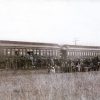calsfoundation@cals.org
Anti-Semitism
Relations between Jews and the rest of the population were generally amicable throughout the South in the nineteenth century, if only because few Jews lived in the region. Although historians point to Abraham Block as the first member of the Jewish faith in Arkansas, when Block arrived in the 1820s, the nearest congregation to his family was in New Orleans, Louisiana—over 400 miles away. The first Jewish congregation in the state of Arkansas, B’Nai Israel in Little Rock (Pulaski County), was not founded until 1866. At this time, out of a state population of more than 450,000, the number of Jews stood at only 400. Most of these arrived to the United States with the great European migration of the 1850s, and most came from Germany and Alsace-Lorraine.
Nineteenth-century Arkansas, as a frontier region, possessed fewer nativists than other places in the United States, and the customary anti-immigrant, anti-Catholic animus of the era held less power in Arkansas than elsewhere. However, as mostly European-born outsiders, Jews did not belong to the planter elite and were therefore not considered social equals to the prominent slave owners in antebellum society. Still, legal restrictions against Jews were few. In 1873, Mathias Abraham Cohn of Little Rock lobbied successfully to change a law in the Arkansas state constitution that denied anyone but a Christian minister the right to officiate in a marriage ceremony. Likewise, several Jews held public positions in Arkansas. Jonas Levy served on the Little Rock City Council before the Civil War, and several other Jews were in the Arkansas General Assembly during the 1800s.
Jacob Trieber is an important example of an Arkansas Jew overcoming customary cultural prejudice in the nineteenth century. Trieber came to Little Rock in the 1860s and faced the likelihood of social ostracism for his background, as well as for his accent and immigrant origins. Trieber was also a Republican and defender of civil rights for African Americans, which made him initially unpopular in social circles. Yet with time, the situation changed. By 1904, Trieber had become a successful banker and member of the exclusive XV Club, at least partial evidence of his acceptance into Little Rock society. Trieber also served as federal judge of the United States District Court for the Eastern District of Arkansas from 1900 until his death in 1927.
At least 8,000 Jews arrived in Arkansas as part of a new wave of immigrants from Eastern Europe from the 1870s through the 1920s. Many of these migrants formed congregations without provoking much apparent hostility from the outside world. While the populist movement, which arose in the 1880s, was known for its anti-Semitic rhetoric, and several populists in the region, notably Tom Watson of Georgia, openly used anti-Semitic language in political campaigns, many Arkansas Jewish politicians seem to have met the approval of voters. The only reported case of anti-Semitism came during the mayoral race in 1913 in Pine Bluff (Jefferson County), during which Simon Bloom’s opponent made Bloom’s background an issue in the campaign. However, this did not stop Bloom from winning the election. During the late nineteenth and early twentieth centuries, many Jews were known for their work in the retail industry as shop owners and merchants. Few, if any, examples of violence against Jews are reported from this era.
One group with anti-Semitic views, the Ku Klux Klan, seemed more interested in attacking African Americans, Catholics, or other groups. While the KKK existed briefly in the 1860s before disbanding, the group made a comeback in Arkansas in much greater numbers in the 1920s. Beginning in Little Rock and surrounding areas of Pulaski County, the Klan eventually included almost 10,000 members at the height of its support around 1927. Yet anti-communism, support for Prohibition, and defense of Victorian ideals of womanhood, as well as opposition to unionization, all took priority for the Klan. Little overt Klan violence occurred in Arkansas during this period, though there were torchings of saloons and intimidation of bootleggers, and the Klan did employ anti-Semitic rhetoric. At a 1922 public event in Mena (Polk County), state kleagle D. E. Rhoads railed against “Jewish influences in financial and theatrical affairs,” among other things; later that year, the Klan apparently forced the local Rexall Drug Store to fire Jewish employee Mendel Badt. Most historians believe the Klan was significantly weakened by the 1930s, even as other hate groups (as well as Jim Crow laws) continued to be seen in Arkansas in the twentieth century.
During the civil rights era, Samuel Levine—a Jewish state senator from Pine Bluff—was an outspoken supporter of integration, having filibustered a bill that would have allowed the Little Rock School Board to be dominated by a majority under the control of Governor Orval Faubus in 1959. The bill is believed to have cost Levine a seat as a chancery judge, and Levine’s opponent made anti-Semitic statements during the campaign against him. However, Levine remained a respected lawyer in his community. Other Arkansas Jews spoke out for civil rights for African Americans during the 1960s, including Rabbi Ira Sanders of Little Rock, who became a strong defender of civil rights and even lectured the Arkansas General Assembly on the issue in 1957. In response to this support, the segregationist Capital Citizens’ Council organized a boycott of large Jewish-owned department stores in Little Rock, and Rabbi Sanders received letters threatening to bomb all Jewish synagogues in Arkansas in October 1958, though none were ultimately harmed. Undeterred, many Jews in Arkansas continued to play leading roles in anti-segregationist groups, including the Women’s Emergency Committee to Open Our Schools (WEC), throughout the late 1950s and 1960s.
More recent examples of anti-Semitism in Arkansas can be seen in the rhetoric of white supremacist groups in the state such as the Christian Identity organization. According to the Southern Poverty Law Center (SPLC), Thom Robb’s Christian Identity ministry operates the Knights of the Ku Klux Klan in Boone County. Robb gained national media attention when he took over the Knights of the Ku Klux Klan from David Duke in the 1980s. In 2013, Robb held the Soldiers of the Cross Training Institute in the Ozark Mountains to gain supporters for the Knights Party. According to SPLC, there are several neo-Nazi organizations in Arkansas; however, it is generally believed that fewer than 10,000 people actively belong to these groups.
In 2023, state Senator Jim Dotson of Bentonville (Benton County) filed SB118, a bill to codify the definition of anti-Semitism in Arkansas law, making it identical to that adopted by the International Holocaust Remembrance Alliance on May 26, 2016. The bill was signed into law by Governor Sarah Huckabee Sanders, becoming Act 126, on February 21, 2023.
For additional information:
Alexander, Charles C. “Defeat, Decline, Disintegration: The Ku Klux Klan in Arkansas.” Arkansas Historical Quarterly 22 (Winter 1963): 311–331.
Bauman, M. K., and B. Kalin, eds. The Quiet Voices: Southern Rabbis and Black Civil Rights. Tuscaloosa: University of Alabama Press, 1997.
Evans, Eli. The Provincials: A Personal History of Jews in the South. New York: Atheneum, 1973.
Heany, Gerald W. Jacob Trieber: Lawyer, Politician, Judge. Little Rock: University of Arkansas at Little Rock, 1985.
Heike, Anton. Jewish Identity in the Reconstruction South: Ambivalence and Adaptation. Berlin: De Gruyter, 2013.
Klein, Toby Lauren Wagner. “Holocaust Education in Arkansas: An Exploration of Policy Process and Implementation.” PhD diss., University of Arkansas, 2023. Online at https://scholarworks.uark.edu/etd/4892/ (accessed December 1, 2023).
LeMaster, Carolyn Gray. A Corner of the Tapestry: A History of the Jewish Experience in Arkansas. Fayetteville: University of Arkansas Press, 1994.
Lockwood, Frank E. “Interfaith Gathering Confronts Antisemitism.” Arkansas Democrat-Gazette, April 29, 2023, pp. 4B, 5B. Online at https://www.arkansasonline.com/news/2023/apr/29/antisemitism-targeted-at-interfaith-gathering-in/ (accessed May 1, 2023).
Ryan Jordan
National University
 Civil Rights and Social Change
Civil Rights and Social Change Immigration
Immigration Religion
Religion ACF Logo
ACF Logo 




Comments
No comments on this entry yet.